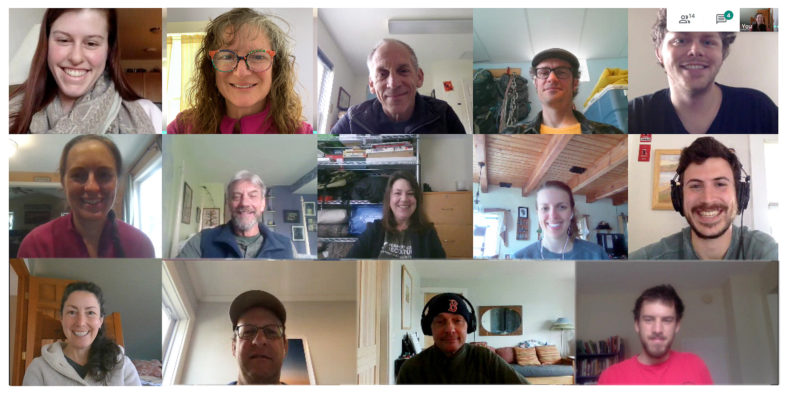
Our May 5 Google Hangout meeting found VCE staff healthy, cheerful, and hard at work from their home offices.
Though the VCE staff thrives on in-person interaction and camaraderie (as anyone who has ever joined us around the lunch table can attest), we are now in week #8 of our COVID-mandated “virtual” existence. While we truly miss our daily collaborations—and banter—in the office, weekly Google Hangout meetings and frequent Slack conversations have maintained a strong sense of cohesion. We’re working hard, successfully navigating online communication, continuing to plan for summer field projects, and keeping our spirits high.
Do I need to mention that spring is unfolding everywhere around us? That, of course, is a godsend, and you can be sure that every VCE staff person is maximizing time spent outdoors, as we exercise both our bodies and spirits. April was a tantalizing, occasionally cruel, month, but with May’s arrival, the natural world’s floodgates are opening wide. Trillium and bloodroot are gracing our woodlands, spring peepers calling at full throttle, early bumble bees industriously buzz-pollinating, Mourning Cloaks and Eastern Commas flashing by on sun-drenched days, Hermit Thrushes fluting and Yellow-bellied Sapsuckers drumming. Life just doesn’t get any more vibrant than during May!

Hermit Thrushes are earning their keep as Vermont’s state bird—and keeping the COVID-19 blues at bay—with their ethereal, flutelike song. © Bryan Pfeiffer
With the recent slight loosening of COVID-related restrictions on travel and physical distancing, VCE staff and our citizen scientists are eager (and relieved) to know that many of our core field projects will proceed during the weeks ahead. One required step that we and our volunteers must take in advance of any field work is to complete a required online training by the Vermont Occupational Safety and Health Administration (VOSHA). This straightforward exercise first provides an overview of COVID-19, then outlines mandatory health and safety requirements for all businesses, non-profits (like VCE) and governmental organizations in Vermont. After completing the training, participants receive an online certificate, which documents an understanding of the safety guidance provided. We urge all VCE citizen scientists to complete this survey as soon as possible. Thanks!
Finally, in advance of VCE’s Backyard Bird Quest 2020 (more on that elsewhere in eNews), the New York Times recently published a wonderful, short op-ed on how birding predisposed one writer for our current sheltering-in-place phenomenon. I believe the message applies equally to birding, herping, botanizing, butterflying, or any other natural history pursuit. As we all narrow our geographic horizons in the outdoors, we can each enjoy knowing more intimately our own local patch(es) and the life that teems there. Such intimacy can only strengthen our good health and strong spirits as we work through these challenging times together.
